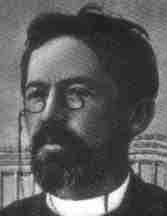|
 |
 |
 |
| Anton Chekhov |
| �w�F�D���i�� |
| �Ϥ��ӷ��G |
| �D�n�����GDrama |
| ��ƴ��Ѫ̡GKate Liu/�B���� |
| ����r���G19th century Russian dramatist and short story writer; Introduction to Literature (Spring, 2000) |
|
|
|
|
Anton Chekhov
1860-1904
|
| �@ |
 Life Events Life Events
 A Brief Biography A Brief Biography
 Characters Characters
 Plot Plot
 Plays Plays
|
| �@ |
 Life
Events Life
Events |
| �@ |
| 1860
|
Born
in Taranrog, Russia |
| 1867-68 |
Taranrog
grammar school |
| 1868-79 |
Educated
at a school for Greek boys, Taranrog |
| 1879-84
|
Moscow
University Medical School |
| 1884 |
Graduated
as doctor |
| 1887 |
First-produced
play, Ivanov |
| 1888 |
Recipient:
Pushkin Prize |
| 1890
|
Traveled
to Sakhalin Island |
| 1901 |
Married
the actress Olga Knipper |
| 1884-92 |
Practice
doctor in Moscow |
| 1897 |
Suffered
severe haemorrhage of the lungs |
| 1898 |
First
collaborated with Nemirovich Danchenko, Stanislavsky, and the Moscow
Art Theater, on a revival of Chayka (The Seagull) |
| 1892-99
|
Practice
doctor in Melikohovo |
| After
1899 |
Moved
for reasons of ill-health to Yalta |
| 1899 |
Member,
Imperial Academy of Sciences |
| 1904 |
Died
in Badenweiler, Germany |
TOP
|
 A Brief Biography A Brief Biography |
| �@ |
Anton Chekhov was a Russian
playwright and short-story writer, who was famous for his masterful
short stories and lyrical dreams.
Anton
Chekhov was born in 1860 in Taganrog, located south in Russia. He's the
third of 6 children.
As
Anton Chekhov grew up, he attended secondary school in Taganrog and in
1879 he enrolled in the School of Medicine at the University of Moscow.
Six years later, he graduated. While in university, Anton Chekhov
unfortunately got tuberculosis. Besides, he had to earn money to pay
his way through college and support his family; Chekhov made a living
by writing stories, short sketches or jokes to journals or papers.
Later, a writer called Dmitry Grigotovich found his talent in writing
and helped him improve the quality of his stories. As a result,
Chekhov's reputation began to grow.
In
1890 Chekhov made a trip to the Prison Island of Sakhalin, which is in
the Far East. After his return to Russia, Chekhov was devoted to the
relief work during the 1892 famine. Then, he bought a small estate at
Melikhovo and moved there with his family. While living there, Chekhov
created some of his best-known works. In addition to that, he produced
two of his major plays, The Sea-Gull and Uncle
Vanya. In 1898, the newly formed Moscow Art Theatre
successfully put The Sea-Gull on the stage.
Thanks to the success, the theatre also began to establish its
reputation.
Chekhov
is famed as a master of the short story. Although some of his best
prose pieces are almost novel length, the stories, as well as his
better-known short works, achieve their effect with a minimum of
artistic means. All of Chekhov's best work is an illustration of his
dictum or statement: " Conciseness is the sister of talent." Chekhov's
plays deal with the passing of the vitality of the Russian gentry.
TOP
|
 Characters Characters |
| �@ |
-
Helpless before the changes taking place in 19th century Russia.
-
Take refuge in elaborate, improbable dreams of renewed prosperity.
�@
|
 Plot Plot |
| �@ |
simple,
mere outlines for the creation of atmosphere and delineation of
character.
�@ |
 Plays Plays |
�@ |
| �@ |
Group
of plays combining comedy, pathos, anticlimax, and digression in a
wholly natural effect.
His
shorter plays include Medved (The Bear,
1888), Tragic ponevole (A Tragedian in
Spite of Himself, 1889), Svadba (The
Wedding, 1889), Na bolshoi doroge (On
the High Road, 1884), Yubilei (The
Jubilee, 1891), Predlozheniye (The
Proposal, 1888), and Lebedinaya pesnya
(1887).
(Also
see The
Complete Works of Anton Chekhov)
TOP
|
�@ |
|
Reference
|
| �@ |
International
Dictionary of Theatre-1 Plays (p.123-25)
International
Dictionary of Theatre-2 Playwrights
(p.184-7)
Guide of Great Plays (p.142, p.147-8)
�@
(External
Links) Chekhov, 19th century Russian dramatist and short story writer, Introduction
to Literature (Spring, 2000)
�@ |
| �@ |
| �@ |
�@ |
| �@ |
|
|
|
|
